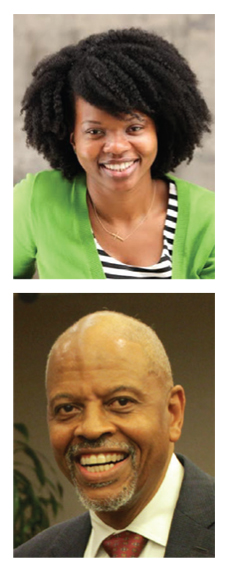
M. Simone Boyd
Onnie I. Kirk Jr.
The Day Sonny Died (see starred review,
LJ 2/1/17, p. 55), coauthored by daughter/father writing team M. Simone Boyd and Onnie I. Kirk Jr., is a gritty, poignant, and realistic debut novel about three generations of an African American family struck repeatedly by violent tragedy. For this novel, the authors have drawn on their experience ministering to African American boys ages ten and older, with absent fathers, and incarcerated men through their Nashville, TN–based Family Foundation Fund to reveal the pain suffered by surviving families. It is their wish that this novel, the story of everyman, will raise awareness of the corrosive effects fatherlessness has on families and children.
Can you tell us about your backgrounds and how the idea for your novel came about? MSB: While working as an energy analyst in Washington, DC, I was summoned for jury duty. The facts of the case were straightforward. A young woman was being tried for drug possession, an unregistered firearm, and other charges. But I found it heartbreaking to know that her nine-month-old son was in the car with the paraphernalia when she was arrested. I felt such empathy and started asking myself questions. Where was her family? What circumstance led to this life? Where would her son be in 15 years? Her face never left me, and I started writing about the life I thought her son would lead. A couple years into writing
The Day Sonny Died, I reached out to my dad and asked if he’d like to join me. Many of the boys he’s mentored shared Sonny’s story.
OIK: My wife and I have been married for 39 years and have eight adult children. In 1993, my family and friends began a ministry to mentor boys whose fathers were absent. After 25 years of mentoring, I wanted to write a book that explained the emotional wound that is left when a father abandons his children.
Many authors have ideas for books that never come to fruition—why this book, and why now? OIK: For us, this is a message more than a book. We know the timing is right because families are under siege: divorce, children born out of wedlock, and untimely death. In November, we led a discussion group with [incarcerated] men. They read the book, shared how Sonny’s story was like their own, and the changes they intended to make. Their feedback helped confirm that the message was true and relevant.
The cover and design of your novel features striking graphics. Can you explain the significance of the images? MSB: The graphics are another example of God’s grace. We held a design contest and a Sudanese artist submitted the artwork. In the larger community of readers, comments range from the search for identity to the idea that Sonny represents everyman. In the [back cover illustration], the rocking chair situated near the [bull’s-eye] target signifies the peace that Constance clings to despite the curse that haunts her family.
The issue of diversity is a hot one in the library field. Simone, as a writer with experience working in a library—what would you like readers to take away from this book? Do you think it is an accurate portrayal? MSB: That word
diversity is tough, because diversity materializes in different ways: economic, educational, geographic, etc. I saw daily examples in the library where I worked last summer. However, ethnicity tends to be top of mind—especially in the publishing industry. Is this an accurate portrayal of all African American families? No, my parents have been married 39 years and my siblings and I are very close. But we still know the pain of generational cycles. Is this an accurate portrayal of the breakdown of families? Yes, the rejection, abandonment, and anger a child feels when left to fend for themselves is painfully precise. As we’ve shared the message of
The Day Sonny Died [with readers], its accuracy has been confirmed time and again. My hope is that people will embrace the truth and forgive. For [those who] cannot relate to the story, we hope they develop empathy, pray, and look for ways to help alleviate [the] suffering [of others].
What’s next? Another novel? Something else? OIK: We are hosting book discussions about the effect of the absence of fathers. Our hope is to see [our novel] read in classrooms, prisons, juvenile justice centers, book clubs, and churches. If there are groups that would like to coordinate a discussion, they may contact us at thedaysonnydied@gmail.com or simone@myfamilyfantastic.com.
—Christine Sharbrough










Add Comment :-
Comment Policy:
Comment should not be empty !!!